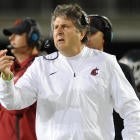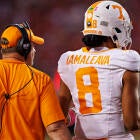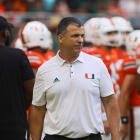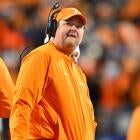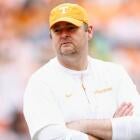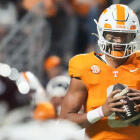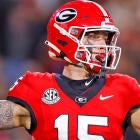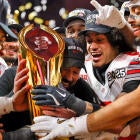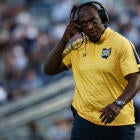When Matt Rhule interviewed with the Indianapolis Colts in January, it was a surprise only to outsiders.
By then, Baylor's first-year coach had informed his athletic director, Mack Rhoades. Four key seniors had been alerted. Transparency was key. Never mind the rebuilding Bears had just finished 1-11 in Rhule's first season.
"Some of the younger guys were a little bit hurt, like, 'Hey, I decided to come here,' Rhule recalled. "I said, 'If we win, this will happen every year. I understand if you'll be mad if I interview for another college job, but if it's an NFL team, none of you should say a word.'"
Rhule didn't get the job, but his desirability isn't going away anytime soon. Part of the reason he's even at Baylor is because of the impression Rhule made on the NFL in 2012 as Tom Coughlin's assistant offensive line coach with the New York Giants. That led to an impressive four-year run at Temple.
In this Year of the Walk Back, interest in Rhule probably won't diminish anytime soon. He's 43, and if Rhule actually gets the lowly Bears going again, he'll have to swat away suitors.
It's just a matter of how Rhule -- or any of his peers -- publicly handle a climb up the career ladder.
There were 21 coaching changes this offseason. It's safe to say there were at least three times that many coaches who had their names attached to those openings.
But for the "losers" who don't get the jobs, what's it like to walk back to their existing gigs, players and bosses needing to explain themselves?
"It's very difficult to walk it back," said Ray Anderson, athletic director at Arizona State. "No matter what the coach says, the boosters, the alums, anybody on campus who is not in your camp, they're just saying, 'Uh, huh, you don't want to be here. Why am I gonna go the extra mile? How do I believe that you're not going to be in that same conversation next year?'"
Answering those questions honestly can make for an uncomfortable return to campus.
Walking back became an issue this offseason because of the Tennessee document dump in March that shined a bright light on what it's like to fill a major-college job opening.
In those documents, at least 13 coaches had their names or resumes attached to the Tennessee opening. That's not counting the 179 mentions of Lane Kiffin by fans. All of it led to the eventual hiring of a coach whose name barely appear in the 8,000-plus pages: Jeremy Pruitt.
Elsewhere in those docs …
- It can logically be assumed that Mike Leach might be the Tennessee coach today if former Vols AD John Currie had not been called home from the West Coast and fired. Late November texts between the two indicate Leach was open to accepting an offer from Tennessee.
- Oklahoma State coach Mike Gundy showed similar (intense) interest in the Tennessee job only to tweet later "Cowboy for Life." He has seemingly made himself a candidate for numerous openings over the last few years, only to remain with Oklahoma State with a new raise after this latest dalliance.
- Before flying to the West Coast to speak to Leach, Currie met with NC State's Dave Doeren, who later announced he would remain with his program. Doeren also received a raise for staying put.
Whatever fallout at home those three coaches endured isn't clear. What is clear: Tennessee is arguably a better job than Washington State, Oklahoma State and NC State.
Leach has turned around a moribund and cash-strapped Wazzu program and can't be blamed for looking elsewhere after six seasons.
"It doesn't mean you're going to do it or not do it. You listen," Leach explained. "If Encyclopedia Britannica called you up, you'd probably listen to them."
Gundy has been through spats with paternal Oklahoma State booster T. Boone Pickens. Gundy seemed ready to leave in November 2017 based on text exchanges with Currie.
Currie: "Beautiful day here [in Dallas, site of an interview]."
Gundy: "Looks like Tenn orange."
Doeren had to weigh what would have been life-changing money from Tennessee. The breathless exchanges between Currie and Doeren's agent, Jordan Bazant, made it clear Doeren was more than interested.
"Gundy is out," Bazant texted at one point. "Let's get this done."
Fortunately for her, NC State AD Debbie Yow was looped in throughout the process. When Currie cooled on Doeren, she had no problem with the way her coach had conducted himself.
The document dump lifted the veil somewhat on a secretive process. The PowerPoints of at least 10 Group of Five coaches were sent to Tennessee when Butch Jones was fired. Those coaches probably weren't going to get the job, but it didn't hurt them having their names out there.
Included in that list were Dana Dimel (now at UTEP), Bryan Harsin (Boise State), Seth Litrell (North Texas), Mike Bobo (Colorado State) and Neal Brown (Troy).
"Agents aren't doing anything clients don't want," one Power Five AD shared.
Gundy had gained leverage in looking elsewhere because of his success --- four 10-win seasons in the last five years. Let's just say Cowboys AD Mike Holder wasn't going to tell the athletic department's chief athletic money maker what to do, despite recent criticisms about Gundy's ability on the recruiting trail.
Leach had plenty of cover. Not only did he have leverage after turning around a Pac-12 loser, he was working at the time with an interim AD. The AD who had hired him, Bill Moos, had left for Nebraska. FAU's Pat Chun had yet to be hired.
"My personal theory is that I need to know about [coaches' job interests]," said Moos, not speaking specifically about Leach. "… I would be upset if I wasn't aware. You get some egg on your face. You can lose credibility if it doesn't work out."
Leach added: "I wasn't in any hurry to leave Washington State. Tennessee was talking crazy numbers. There's that and the other thing is [that] Washington State won nine games last year. That's what Tennessee wants to do."
The intricacies of job searches aren't in any textbook.
High-priced agents can do the manipulating without a trace. On any given Saturday, super agent Jimmy Sexton has coaching clients facing off in the same game.
Last year, two of the biggest names in the sport -- Jimbo Fisher and Chip Kelly -- got new jobs. Dan Mullen moved from one SEC school to another.
Power Five-to-Power Five job switches are somewhat rare. They usually follow this pattern: 1) It's home -- see Willie Taggart moving from Oregon to Florida State; 2) It's clearly a better job -- Mullen going from Mississippi State to Florida; 3) A coach/school needs a reset -- Fisher leaving a successful run at Florida State to start over at Texas A&M.
"You can't keep playing Russian roulette with coaches," said former college coach Glen Mason, now a Big Ten Network analyst. "You can't keep buying hope. There are only two things in sports -- results and hopes. When they don't get the results they want, they have hope."
Mason should know. He remains the ultimate Walk Back Coach. Toward the end of the best season of his career -- 10-2 at Kansas in 1995 -- he took the Georgia job.
Made sense, right? You don't have to be told that KU is a bit of a black hole in football. Except a funny thing happened on the way to Athens, Georgia.
Mason changed his mind.
The night before a Hawaii Bowl win over UCLA, Mason decided the grass was greener in Lawrence, Kansas.
"It was obviously quite unusual," Mason said. "… Even then, people in the profession said, 'You did what?!' Georgia's always been one of those jobs that was regarded as a top 10 job. If not that, really close.'"
Mason took stock of his personal life. He was divorced and raising his two children as a single parent. Kansas, a program he had hoisted from the bottom of college football, remained the best place to be.
Then, there was the reaction by his players, coaches and bosses the night before that bowl game.
"When I made the announcement, the players gave me a standing ovation," Mason said. "I thought, 'Wow.' I had talked to [former chancellor] Bob Hemenway. He gave me a big hug.
"Then we destroyed UCLA, so all was good."
The feel-good atmosphere lasted less than a year. Mason went 4-7 in 1996, then split for Minnesota.
But for a coach who was allowed to come back from turning down Georgia, "it was a head scratcher at the time," recalled Mason
It remains a reference point for any coach who has to walk back to the campus he tried to leave.
![[object Object] Logo](https://sportshub.cbsistatic.com/i/2020/04/22/e9ceb731-8b3f-4c60-98fe-090ab66a2997/screen-shot-2020-04-22-at-11-04-56-am.png)







